A friend - Issac Young - sent me a link to a written version of Flannery O’Connor’s lecture The Nature and Aim of Writing for my enjoyment.
Sadly, I did not particularly enjoy it. Her words dripped with a sourness masquerading as a no-nonsense attitude. This tone ruffles feathers when it comes from a man but can be respectable. However, such a tone is distinctly off-putting from a woman. The direct, tough, no-nonsense approach is masculine in essence and I don’t feel it is becoming from a woman.
Fair to say, the tone and manner of address did not sit well with me.
Of course, every essay must be judged by its ideas rather than its presentation but even here I cannot be wholly positive. There are a few bullseyes from O’Connor and it is worth reading her lecture simply for those insights.
Alas, these insights are often coupled with questionable stances. For instance, O’Connor says that life experiences don’t make writers. This is correct. There have been many people who have done and witnessed incredible things who are still incapable of and disinclined to putting pen to paper and sharing these experiences with the wider world. But she says prior to this that just by surviving childhood you have enough necessary life experience for being a good writer.
This is abject nonsense.
Despite how it might appear, I’m not here to nitpick O’Connor’s lecture. Quite the opposite, I’m here to speak about a few of her insights which are 100% correct.
One of these insights is that competent writing doesn’t make a story worth anything – “We want competence, but competence by itself is deadly. What is needed is the vision to go with it, and you do not get this from a writing class.”
She is correct.
While O’Connor never defines it, I imagine competence would encompass good plotting, appropriate characterization, prose, grammar, presentation, composition etc.
Basically the basics. The functional elements of a story; its creativity coherency (a term I coined in this video).
On my YouTube channel, I have lambasted films because of incoherent writing. Modern Critic YouTube is based on criticizing films for being made by incompetent woke writers who couldn’t write a half-decent story if their lives depended on it.
It is easy to think, if modern Hollywood were to write competently again, films would become entertaining again. Certainly, it would be nice to watch something without insulting plot holes.
But O’Connor is right when she warns her audience that competence is not enough. And it was after reading her lecture that I finally realized why Disney’s film Dinosaur had proven to be such a conundrum for me.
Dinosaur
Dinosaur (2000) is a film comprised of real life props, sets, geographical locations and computer-animated 3D characters. From a technical perspective, the filmmaking is innovative and inventive (especially for the time).
The plot is reminiscent of The Land Before Time (1988), although it is not quite the same.
The synopsis is that an iguanodon egg is taken from its nest to an island inhabited by pre-historic lemurs and no dinosaurs. The lemurs name the hatchling Aladar and raise him like one of their own.
Many years pass and Aladar grows into his species’ equivalent of a young man. Life is peaceful and pleasant enough until a meteorite lands in the ocean. The majority of the lemurs are wiped out by the resulting tidal wave and Aladar, his adoptive sister, uncle, mother and grandfather are washed ashore to the main land.
The fallout from the meteorite has affected the weather on the continent and caused drought. Aladar and his adoptive family find a herd comprised of various species of herbivorous dinosaurs who are on their way to the nesting grounds where they hope to find food and water.
Aladar discovers they are led by Kron, a cold-blooded and uncaring iguanodon, who willingly lets the weakest members of the herd fall behind and die to distract the predators who are hurting them (a pair of carnotauruses). Kron’s leadership and ideology, which are accepted wholesale by the herd, clash with Aladar’s own sense of morality and he fights to make the rest of the dinosaurs understand the virtues of cooperation and comradery on their way to the nesting grounds.
Spoiler alert: They make it to the nesting grounds. Aladar becomes leader of the herd and persuades the other dinosaurs of the virtues of his ethics, gets a girlfriend and becomes a father. Meanwhile, Kron is effectively killed by his own selfish, Darwinian belief system.
Nearly everyone lives happily ever after.
The Land Before Time
Before discussing Dinosaur further, it will be necessary to review a quick synopsis of The Land Before Time.
The Land Before Time is a 1988 2D animated film and seems to be one of the inspirations for Dinosaur. The plot is similar although the inciting incident is far more interesting.
The protagonist is an apatosaurus called Littlefoot who is his species’ equivalent of a child. In fact, all the main characters are children and not adults.
All the herbivore dinosaurs are migrating because of a famine and their destination is the Great Valley. All the dinosaurs move in the same direction but they keep to their separate species. The apatosauruses keep to themselves as do the triceratopses and so on.
Littlefoot and a triceratops called Cera play together on the journey but are broken up by their parents who basically say “we don’t associate with their kind”.
One night on the trek, Littlefoot and Cera play together again and are attacked by a tyrannosaurus rex and they are saved by Littlefoot’s mother who engages it in battle. An earthquake then occurs and multiple dinosaurs die but more end up separated from each other as there is a rupture through the land which divides the herds.
Littlefoot and Cera are separated from their families and Littlefoot has a final conversation with his mother before she dies from wounds inflicted by the T-Rex.
Littlefoot, Cera and several other dinosaurs separated from their parents have to find their way to the Great Valley by themselves without any adult help.
Spoiler alert: They all make it to the Great Valley and drown the tyrannosaurus rex which killed Littlefoot’s mother.
The Writing of Dinosaur
From the brief synopsis of Dinosaur previously provided, one would be forgiven for imagining that the writing for the film is simply dire.
I watched Dinosaur as a very young child and had the chance to re-watch it and decided it would be interesting to see it again with adult eyes.
I only remembered the music and a few select scenes from the film and I expected it to be shoddily-written.
But I was surprised to find that the film is not badly-written.
To be sure, Dinosaur is hardly original and you can guess the plot beats with your eyes closed but this does not mean that the writing is awful. In fact, its writing puts many contemporary films to shame (not the biggest achievement but it is something).
There are no obvious plot holes, the characterization is good, the humour mostly lands and the interactions, dialogue and drama are functionally composed. If the film was presented as the first draft of a script, there wouldn’t be much to complain about on a creative coherency front.
From a thematic and moral message perspective, it is all wholesome stuff. Aladar is a young dinosaur but he has virtues and strengths of someone beyond his years. While the other dinosaurs care nothing for the old dinosaurs at the back of the herd who fall behind, he takes it upon himself to help them make it to the nesting grounds.
The ideals of cooperation, family, comradery and caring for others are presented strongly without lecturing and they are agreeable sentiments.
At the end of the film, Aladar and a female iguanodon called Neera become young parents and have hatchlings.
So Dinosaur is a competently-written film with wholesome morals.
Even if it is a bit generic, it is mediocre at worst rather than outright bad. Outright bad would be The Rise of Skywalker, while The Last Jedi would be outright awful.
So who could honestly dislike Dinosaur?
Competence in execution but nothing of substance
If I am allowed the luxury of extrapolating from her lecture, I believe if Flannery O’Connor were alive today and watched Dinosaur, she’d say it was competently written and nothing more.
This is how I feel after watching it, although I feel some conflict. A part of me does not want to criticize the film because its general moral outlook is broadly agreeable to my own and the writing isn’t bad.
However, I shall criticize it and not only because I dislike the film but also because it is a good example of a creative trap which every writer should be careful of falling into and I am as guilty as anyone.
It is easy to believe (fool yourself really) that in order to write a great story, all you need to do is write competently. No plot holes, solid characters, no preachy morals, good natural dialogue etc. etc. etc.
But O’Connor is right about competence, it’s only one of the essential ingredients to creating a good story.
Dinosaur is competent but it lacks a soul and any substance.
The issue is not that Dinosaur is badly-written per se, the issue is that it’s not good.
It’s merely competent.
Reality and Escapism
Before we continue, we must heed another insight from O’Connor. In her essay, O’Connor expresses disdain for the idea that fiction is merely escapism from reality. She contends that fiction is a plunge into reality.
This may sound counterintuitive and wrong, especially for those of us who are fans of Tolkien and his essay On Fairy-Stories. However, I believe she is completely right and that her assertion can be reconciled and synthesized with Tolkien’s ideas on escapism.
Tolkien argues that wishing to escape can be noble. He uses the metaphor of a prisoner who, unable to escape his jail, thinks and dwells upon the world outside the walls of his cell. Tolkien observes that the world outside the walls has not become less real just because the prisoner cannot see it.
In Tolkien’s own magnum opus, there are many creatures and things which do not exist in the real world (or to use Tolkien’s jargon: “primary world”) – orcs, goblins, elves, hobbits, magic swords etc.
However, there are things which do exist in the primary world. Heroism, self-sacrifice, final stands, courage, friendship, wars, death, battle, despair, heartbreak, sadness, evil, good, delicious food etc.
When one reads Lord of the Rings closely, he discovers not a sanitized wish fulfilment piece but instead a story with words and observations on matters and ideas found in the real world.
This is where O’Connor’s proposition that fiction is not escapist but instead “intensely real” comes into play.
Day-to-day life in the real or primary world can be like a stagnant pool - dirty, opaque and dark. But story worlds (or to use Tolkien’s term “secondary worlds”) in good stories are like crystalline lakes – clean, clear and bright.
If you dive into a stagnant pool, you will find it hard to see anything. The most precious glittering rubies could be at the bottom of the waterbed but you will be hard pressed to find them. Yet, the same precious rubies in a glassy lake will be seen, the moment you dive into the water.
It is the same with good stories.
Good stories serve to clear the mind and focus on important truths and on reality itself by extension.
A good story can be more accessible and instructive on truths than the greatest philosophical treatises.
A good story has a greater power to change minds than even the best rhetoricians.
A good story can inculcate virtue more directly than any of the seminal teachers.
In summary, fiction is always escapist in that it takes the reader away from the primary world and into a secondary world where the nature and reality of the real world is clearer and less adulterated by mere noise.
In this way, fiction is both escapist and realist.
The Problem with Dinosaur - Aladar
Now we shall return to Dinosaur and why I have named the essay O’Connor vs Dinosaur. Although, I must confess that it would have been more accurate and to the point if I had named it O’Connor vs Aladar. Or perhaps even, O’Connor and Tolkien vs Aladar.
As previously discussed, O’Connor describes fiction as a plunge into reality, and I have made the case that escaping into a story can allow you to see the real world more clearly.
Another of O’Connor’s arguments which is closely related is that good fiction is presented in such a way that the reader has the sense the story’s events are unfolding naturally.
Or in other words, the reader believes he is reading/viewing real events and not watching a carefully-constructed machine in motion.
This is where Dinosaur fails. For the film is not an unfolding sequence of events but instead the computations and rotations of a competently-designed and well-oiled machine program.
The problem lies in Aladar himself. He is the rotten foundation which the whole film is built upon.
On first watch, it is not obvious why he is so bad, but when you inspect the character closely, you discover that he is a two-dimensional, cardboard cut-out and, on the back of him, it says the type of young man we would like in our society.
Aladar is not an organic character with his own thoughts, desires and psychology. Instead, his entire being is constructed to be as wholesome and agreeable as possible to the creators’ worldview.
The consequence is a character without any flaws and any energy of his own. He may not be a Gary Stu but he doesn’t suffer any defeats or put a foot wrong. If he has a flaw, it is being too respectful and polite to the heartless leader Kron when he first meets him (he addresses him as “sir”).
All the normal flaws which we commonly find in young men, (and remember, Aladar appears to be his species’ equivalent of a young man) impulsiveness, over-competitiveness, immaturity, low self-control etc. are completely absent in Aladar.
He also doesn’t have the typical desires found in young men. If you examine stories aimed at young men, the ones written by people who don’t hate them, you will find they have adventure, action, danger, treasure and hot women.


Young men fear and yet yearn for adventure.
Aladar has none of these yearnings or any fears about them. Instead, his values and desires are all orientated around his adoptive family of lemurs and towards the rest of the dinosaur herd later in the film.
It’s almost as if Aladar is an older gentleman in a younger man’s body but the issue is that he doesn’t have the character strengths of an older man. He doesn’t have the self-confidence, self-assurance or grit associated with older men in stories.
This is all completely bizarre when you consider that he was raised, not by dinosaurs, but by lemurs. He should be confused, socially awkward and clueless when talking and dealing with other dinosaurs. Realistically, he should be a weirdo and be disliked by the dinosaurs in the herd and yet they all take a shine to him (except for the villain of course).
It doesn’t make any sense until you realize that he is the writers’ attempt at depicting what they believe would be the ideal young man in society. When this is understood, the penny drops.
This is the reason Aladar helps the old ladies of the herd even at risk of his own life, the reason he is so polite and mannerly to Kron (at least initially), the reason he is always right, the reason he doesn’t doubt his values or beliefs (even once), the reason he is so good with kids, the reason he is so self-sacrificial, the reason why he is so deferential towards his elders, the reason he is so compassionate, the reason he is so brave and the reason why no one dislikes him except Kron and the carnotauruses (who are monsters rather than characters) – it is because he is a laundry list of the writers’ preferred character qualities for young men.
He isn’t a character in the true sense, he is a program which executes functions that the writers appreciate. He is a character in a propaganda reel.
As a consequence, he doesn’t struggle or suffer, he doesn’t make any mistakes and he quickly arrives at an answer for every problem he faces. The audience is never allowed to think that he might lose, fail or die.
He is also boring.
On first viewing you may not see this, in fact, it is easy to get blind-sighted by the wholesome values in the film because they are so agreeable (to the point of sickness). But I personally felt hollow after finishing the film, even while intellectually agreeing with its promoted values.
Stepping back a bit and reflecting on our previous foray on escapism and realism in fiction, it is easy to see how Dinosaur fails as an escapist story which allows the viewer to plunge into reality.
How can the audience escape into a story where the main character doesn’t seem real? And how can the audience deeply ponder the important realities of family, compassion, bravery, self-sacrifice etc. when the whole narrative is constructed like a stiff propaganda piece and the main character never fails or suffers?
Dinosaur is competently-written enough so you don’t notice that Aladar is two-dimensional and that the story is essentially wholesome propaganda on first viewing but there are two serious consequences:
First, if you reflect, you will quickly realize Aladar is two-dimensional and that the story is propaganda which will forever put you off the film.
Second, even if you don’t notice the above, you will quickly forget the film because it feels hollow and fails to leave an impact.
When I recently finished the film, I realized I didn’t feel anything and had a sense of mild boredom. When I focused my mind on the matter trying to discover why the film made me feel nothing, I realized that Aladar was a cardboard ideal rather than a character and I began to despise the film.
The Land Before Time – Littlefoot
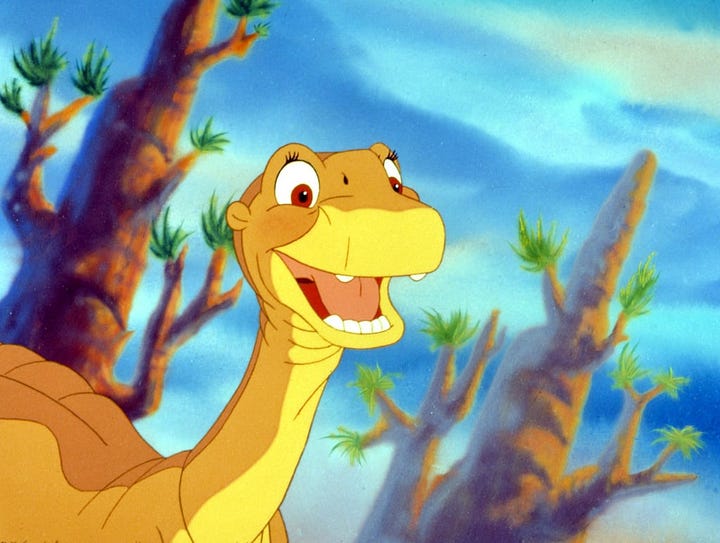
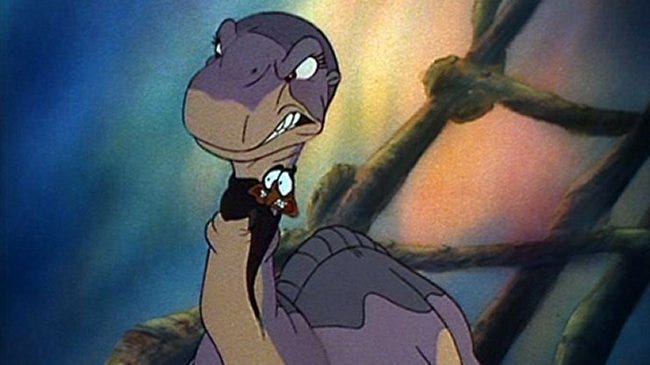

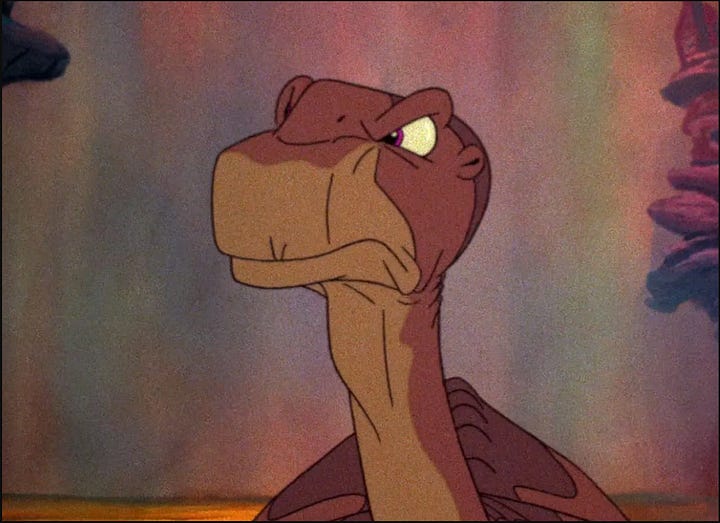
The protagonist of The Land Before Time is better than Aladar and that it is putting it mildly.
At first glance, Aladar and Littlefoot seem the same. Yes, one is an adult and the other is a child, but they are both herbivorous dinosaurs who believe in working together and caring for each other, even against opposition from authority figures.
Aladar has to deal with Kron the leader of the herd whose heartless, Darwinian ideology leaves the weakest under his care to die. Littlefoot has to deal with Cera’s father via proxy, because Cera has accepted her father’s belief that each dinosaur species should stick to its own kind.
Yet there is a crucial difference which makes all the difference for The Land Before Time and helps make it one of Don Bluth’s best works.
That difference being: Littlefoot is his own character.
Littlefoot isn’t the filmmakers’ attempt to create an ideal child or schoolboy who is completely agreeable and wholesome. Littlefoot has flaws, he’s immature, he makes errors in judgement and he acts like a child.
This last one is important. Littlefoot not only is a child; he also acts like one. This is in contrast to Aladar who is a young man but doesn’t act like one.
What is more, Littlefoot has the yearnings of a young child. He wants to play with other children, he wants to be with his family and he wants the safety and comfort of the Great Valley which he knows is a veritable paradise where all these things can be found.
Because Littlefoot isn’t perfect he has to struggle and suffer to get to the Great Valley. He not only suffers the loss of his mother early in the film, later on, after leading a ragtag band of young dinosaurs over some mountains, he gets into a fight with Cera about which direction they should continue travelling and it turns physical. He loses even though he fights spiritedly. With tears in his eyes, he shouts insults at Cera and continues stubbornly upward and onward and leaves the rest of the group who are too tired to follow him.
Speaking of the rest of the cast, the other child characters in The Land Before Time also act like children. They are all unique, they all have own weaknesses and admirable qualities and they are all their own characters yet they act like children because they are children.
Because Littlefoot, Cera, Ducky and Petrie act like children and have their own strengths and weaknesses, they feel real and don’t come across as robotic. As a consequence, the narrative unfolds from their actions, inactions and interactions with one another in an organic fashion.
The writers of The Land Before Time had the intelligence and awareness to know that writing perfect/idealized characters would diminish if not outright destroy the quality of the film.
Good writers know that perfect characters are rarely good news for any story because audiences find it hard to like them.
Competence and Exploration make Good Stories
In her lecture, O’Connor says “competence needs to be matched with vision” in order to make a good story.
I believe competence and vision are important but I think there is something even more vital than vision.
It is my belief that what elevates a story to the realms of good is less vision and more exploration.
Life is neither fully charted nor fully understood, and all good artists know that reality is complicated and nuanced and that everyone experiences the world differently. Because the good artist knows this, he is often curious rather than dogmatic.
The curiosity of the artist will often lead him beyond conventional spheres and into the unknown, the unconventional, the potential, the forgotten and the neglected realms of reality and thought where he becomes an explorer. Artists ask questions which others don’t even think about asking.
Asking questions is fundamental to exploration in fiction.
But even within spheres of human experience which are ubiquitous and common, artists can still act as explorers and provide new insights and perspectives. Moreover, even when a subject matter is well-trodden ground, it can still be advantageous and refreshing for the soul to explore that space again.
Exploration can raise a story to new heights or raise things in said story to a higher level. I’ll give an example from my own work, the third book in the High Realm Trilogy – The Return to High Realm.
This final instalment in the trilogy will probably forever remain the most difficult of all my writing projects. I wrote the first draft in 2020 and it was so bad that I scrapped it and started again from scratch. This is noteworthy because I’ve never had to do this before or since.
I completed a second draft in 2021. This version was infinitely better but I felt it was missing something. As time passed, I realized that although I was portraying a kingdom suffering under a tyrant, the land seemed too small. The island of Creta in the first book Escape from Labyrinth seemed bigger and deeper by comparison.
I realized I hadn’t properly explored the kingdom of High Realm or the evil reign of the tyrant. So I amended some chapters and added another four chapters in the middle of the story and introduced another villain in league with the tyrant and another hero called Rodger Sherwood.
Thus this was the third major rewrite and became the third draft and every other draft was simply an updated or edited version of it.
What I want to talk about is the character of Sir Wulf who is introduced in the second chapter of the story in all versions. In both the first and second drafts, Sir Wulf was a character who acted as both an expositor (telling the heroes what had happened in High Realm since they vanished) and as a vehicle to get the plot rolling (taking the heroes to Earl Bromley to see if Alfwuld really was the crown prince and to try breaking his curse).
And Sir Wulf… worked.
He was written-competently for this role and none of my beta readers said anything negative about him in the first two drafts so he was a functional component in the story.
But as I embarked on the third draft, I realized, although Wulf worked and didn’t technically need any rewriting, I had completely neglected to explore what he thought about Alfwuld.
I wanted Wulf to lead the heroes to Eric Bromley to get the plot moving and there was no doubt in my mind that the character would and should do this, but I hadn’t put myself in his shoes and asked myself the following question:
“If you were a knight, and you were watching your kingdom and people suffer under the reign of a tyrant falsely claiming to be royalty, would you seriously take the word of a strange, flightless bird who claims to be the missing crown prince? After all that has already happened?”
When I asked this question, I discovered the answer was no. And I knew I couldn’t leave the scene as it was.
You can read the first three chapters of the book on this Substack or listen to an audio reading here on YouTube (or Substack) to discover how exactly Wulf reacts when Alfwuld reveals this to him but I’ll summarize here.
Wulf, who has already had his heart torn out by current events, believes that Alfwuld is another liar and impostor who will bring more pain to the people of the kingdom and draws his blade to kill him and it is only Sam’s arguments and pleading which stop him. Wulf reluctantly agrees to take them to Earl Bromley but he still doesn’t believe that Alfwuld is the crown prince and is only convinced when the curse is finally lifted.
The moment I started to rewrite the scene in chapter three where Wulf is told that Alfwuld is the crown prince, I felt less like a potter crafting a vase from clay and more like an archaeologist slowly discovering the fragments of an ancient urn and carefully assembling the pieces. I became an explorer in my own story and discovered that I had never known who Wulf was up until this point.
He seemed to gain a life of his own.
While rewriting chapters further into the book, I found myself looking at a feeling not seen before in this story - resigned despair.
I discovered that Wulf didn’t believe that the real prince would ever return to High Realm and also believed the kingdom would suffer under the reign of the tyrant for the rest of their lives.
But that was not all.
I discovered that Wulf - in spite of his despair - was steadfastly virtuous and arguably more virtuous than all the other characters in the story. Wulf, despite his belief that his (and everyone else’s) actions were ultimately pointless because they couldn’t depose the false king and replace him, continued to do what was right. He never gives in or stops fighting in the story even though he believes it’s ultimately for nought.
The inclusion of this fully realized Wulf provides a fuller exploration and wider panorama of the emotions and beliefs of people striving against tyranny.
After making the change, I found I was exploring rather than creating Sir Wulf and that the story was much better than before.
Exploration in The Land Before Time and Dinosaur

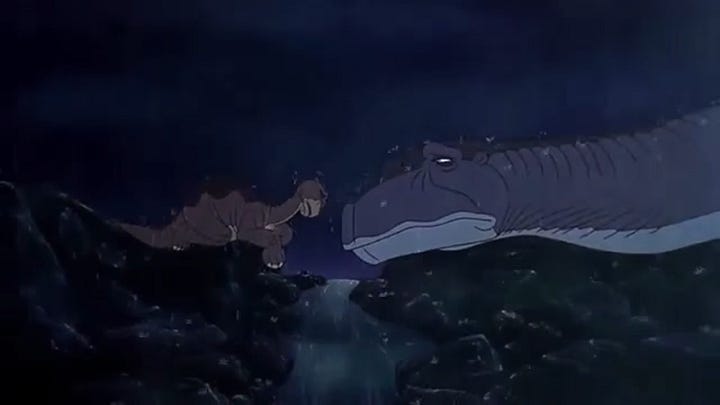
I promise this is the last time I will compare The Land Before Time and Dinosaur.
If we examine the two films, we can see that both are competent but only one actually explores anything.
The Land Before Time
Let’s discuss what The Land Before Time explores. There are two main themes.
The first is grief and the second is working together in spite of prejudices.
The first subject is explored after Littlefoot’s mother dies and a period of mourning is shown, where he doesn’t eat, doesn’t go anywhere and loses all motivation to do anything. Aside from a moment where a dinosaur called Rooter shares some wisdom with Littlefoot, not a lot is actually said. The grief is just allowed to play out and it isn’t clean.
Littlefoot initially blames himself and his mother for her death and it takes Rooter telling him that this is not true before he changes his mind. For the rest of the grieving sequence in the film, Littlefoot wallows in misery and does nothing which advances the plot.
It is apparent that the writers asked themselves what it might look if a child lost his mother in this scenario and took the time to explore it.
The second subject is explored after Littlefoot and the rest of the child dinosaurs set off together to try and find the Great Valley where the various herds were heading. Cera begrudgingly follows Littlefoot and the rest of the little herd because there is no real choice but she makes it clear that she takes no pleasure in it and believes that everyone should stick to their own kind.
Cera’s belief is an analogy to a rather nuanced political and social reality which no one reading this essay will have a hard time guessing correctly. By the end of the film, the beliefs of filmmakers on this topic are evident. What is noteworthy is the lack of moral lecturing on the part of the creators and their maturity not to make caricatures of other perspectives on this matter with which they don’t agree.
If The Land Before Time were made today, Cera, her father, Littlefoot’s mother and everyone else who happens to hold the idea that each dinosaur should stick to their own kind would be presented as a reprehensible devil. But Cera’s father and Littlefoot’s mother are presented as normal parents who just want to protect their children.
Cera has a number of vices – she is stubborn, proud, selfish, combative and unable to accept her mistakes. Yet, she is also brave, determined and, importantly, isn’t malicious. Her adherence to her father’s ideas and her attitude toward Littlefoot and the others is foolish given the circumstances but, in her defence, she is a child and we shouldn’t expect wisdom.
So, if characters like Cera aren’t portrayed as evil in the film, what does the clash of ideology look like between Cera and Littlefoot?
It looks organic and feels natural. And the reason is because the creators appear to have genuinely been exploring what this conflict might look like between children who are in dire straits. It doesn’t seem to me that they were interested in virtue-signalling or creating propaganda.
Of course, they do come down on one side of this ideological/philosophical debate but exploration does not mean withholding judgement. The point of exploration in fiction is to examine, experience and contend with something so you can say something about it; not so you can pretend to be a neutral observer with no opinions of your own, because that is tantamount to intellectual and creative cowardice in nearly all cases.
When one goes exploring, a destination is always reached after so long.
On this point, it is worth remembering that even if a writer makes a messy or incomplete exploration or arrives at low resolution or even draws erroneous conclusions from his journey, it does not necessarily mean his story is badly-written, without artistic merit, insincere or base propaganda.
Creators can and do make sincere mistakes.
Dinosaur
So what does Dinosaur explore?
Well, it is hard to point at something which doesn’t exist. Since, as previously mentioned, nothing is explored in the film.
What I can do is show a failure to explore a matter which really should have had its own moment in the creative sun.
In the beginning of the film, a meteorite strikes the ocean and the island where Aladar and his family of lemurs have been living is destroyed but they manage to escape to the main land. But they weren’t the only persons who lived on the island. A whole clan of lemurs lived there and, while Aladar and his adoptive family survive, the entire lemur tribe dies.
There is a moment where one of the surviving lemurs makes a loud animal call but she receives no response. Aladar makes a call/howl of his own but again there is no response.
The child lemur who makes the call, tears up and says: “They’re all gone.”
The rest of the film then continues on without the deaths of these lemurs being mentioned or discussed again. In fact, from this point on, you can just forget about the island because that is what Aladar does.
Obviously, this is less-than-brilliant writing. But I believe the writers could have made the entire “and we’ll never mention lemur island again in this story” work with one additional scene.
The writers needed to ask themselves this question: “If Aladar and his family aren’t going to spend more than a few minutes on screen mourning, what is the reason? What does Aladar believe and feel that enables him to maintain a stiff upper lip?”
The writers in film neglected to ask this question and probably just said to themselves: “Well, now that the inciting incident is over, we can start the real plot”. In other words, they didn’t bother to explore the thoughts and feelings of their own characters.
But if they had answered this question, they would have started a real exploration of the problem of grief after a tragic and catastrophic event.
Here is how I would have answered this question and made the story a bit better. It would only require one additional scene right after the meteorite strike.
The scene would take place the morning after the meteorite strike and Aladar and his adoptive family would be on the beach, the shores of their destroyed island visible with the rising sun.
The younger members of the lemur family would be completely broken by grief. If left to their own sorrow, they would lie on the pebble beach, their strength fading and their hearts forever fallen.
Aladar would take one last pained look at the island and turn to his adoptive family, the only family he has ever known and the only ones who he has left in the world, and say something to the effect of:
“It is not safe here and we cannot stay. We need to move. I don’t know where. But we can’t stay here.”
His family would listen to him and be encouraged to move by his display of willpower and emotional strength, even if still in pain. Aladar would then say something along these lines to himself and himself alone:
“You don’t have time. You have to be strong. For yourself… and for them.”
Cue next scene.
With this short, simple scene, we not only would have had a tiny moment of exploration into Aladar’s spiritual, psychological and emotional state after the tragedy but we’d also get a demonstration of his motivations and values that would feel real. It would add depth to him and also justify why the film never fully addresses the grief that Aladar and his family would feel after that dreadful event.
Furthermore, it would explore the idea that sometimes you don’t have the time to process even terrible pain in the wake of a disaster. Sometimes, you have to pick yourself up and move forwards in spite of it all and only reflect later when you have made it safely through to the other side.
And, of course, it would provide a valid reason why we don’t see any of the characters grieving during the rest of the film or hear any mention of the island or the dead lemurs ever again.
Conclusion
Dinosaur is a competent but soulless construction. Dinosaur is what happens when you tell a group of writers to come up with a story that has wholesome morals, is family-friendly and allows your animation department to showoff new techniques, skills and technologies.
The end result is forgettable.
From a writer’s perspective, there is no vision and no exploration.
Dinosaur stands as testament to Flannery O’Connor’s argument that competence is not enough to write a good story.
The story is flat, boring and as forgettable as a cup of lukewarm water.









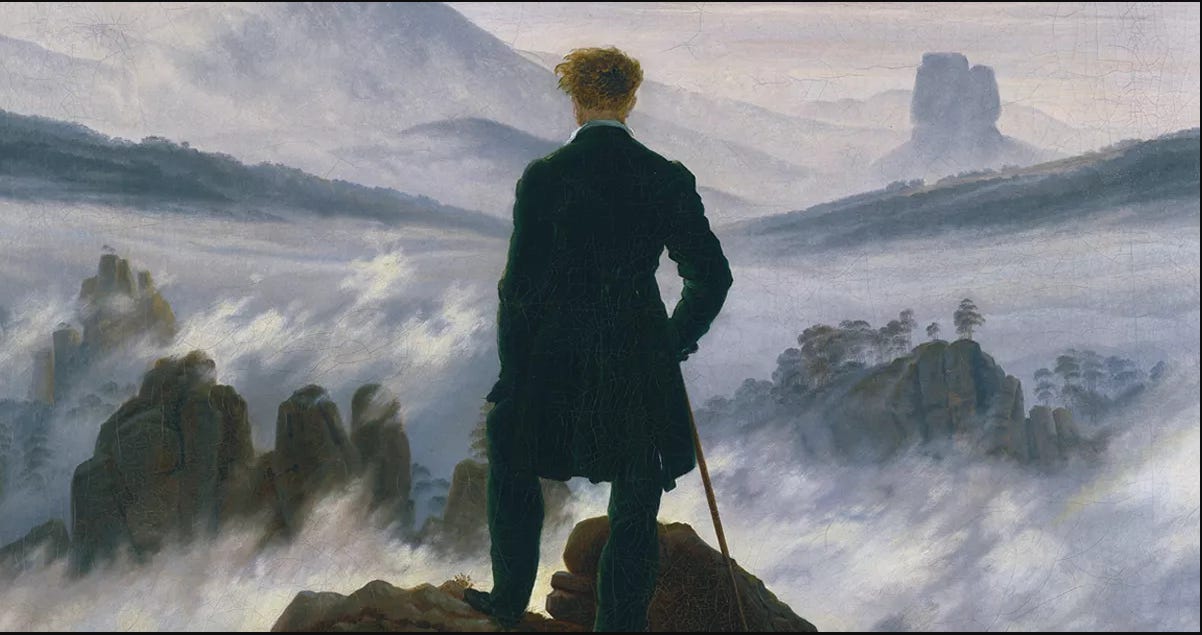
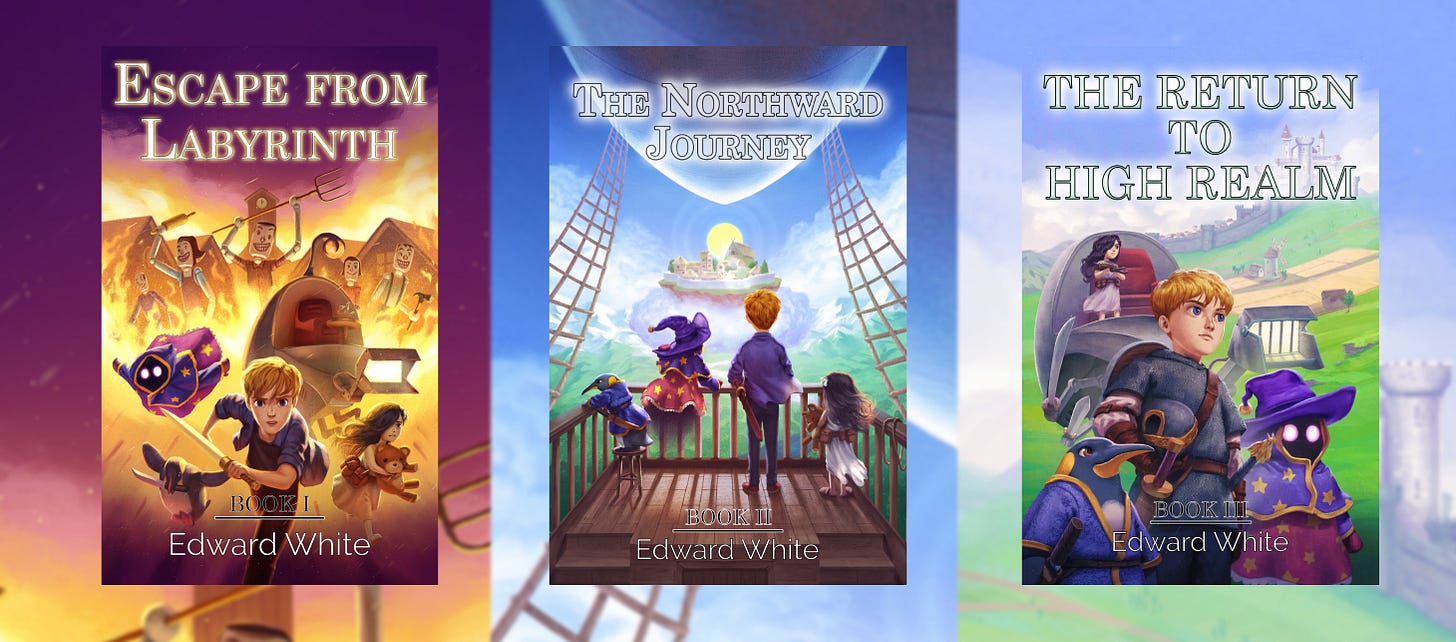

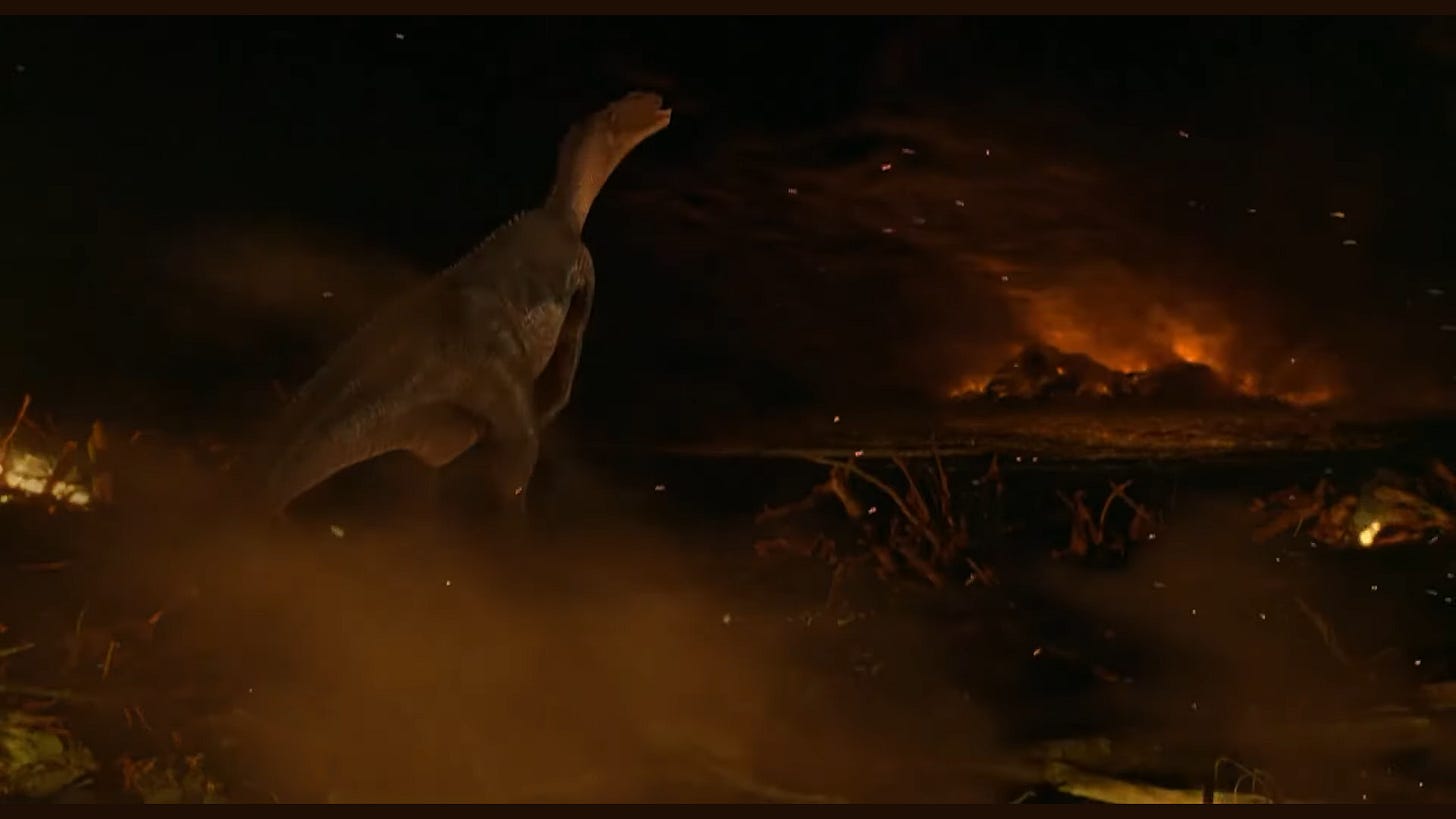
Wonderful essay. While there is are so many elements worth commenting on, I’m going to limit myself just this:
You’re analogy of writer/artist as an explorer and archeologist rather than creator is fantastic. When composing fiction, I find myself spending a lot of time coming up with a back story for various characters, much of which I can’t figure out how to incorporate into the story. I’ve never felt it was a waste of time to do this, even though it meant many of my self-imposed deadlines weren’t met or that early drafts end up being way too drawn out. Until reading that analogy this morning, I never understood why I didn’t consider it a waste of time even though it meant I wasn’t meeting my “goals.” You’ve put to words something I intuitively understood-and is one of my favorite parts of the writing process, honestly-and I can now engage in the process more intentionally and consciously, understanding that I’m an archeologist finding the evidence necessary to craft a narrative and not an ADHD dreamer who can’t stay focused on the task at hand. After all, if I’m the archeologist/explorer, it is exactly the task at hand I’m focused on. Time will tell, but I expect being able to approach writing with this consciously in mind and engage in it with intention, it will make me a better writer. If so, then it will be thanks in no small part to this essay.
Also-love the school marm jab-nicely done.
"It doesn’t make any sense until you realize that he is the writers’ attempt at depicting what they believe would be the ideal young man in society. When this is understood, the penny drops."
Not just any abstract "writers" but specifically feminist writers vision of what a "good boy" is under matriarchy. It is a school marm's vision of the ideal young man.